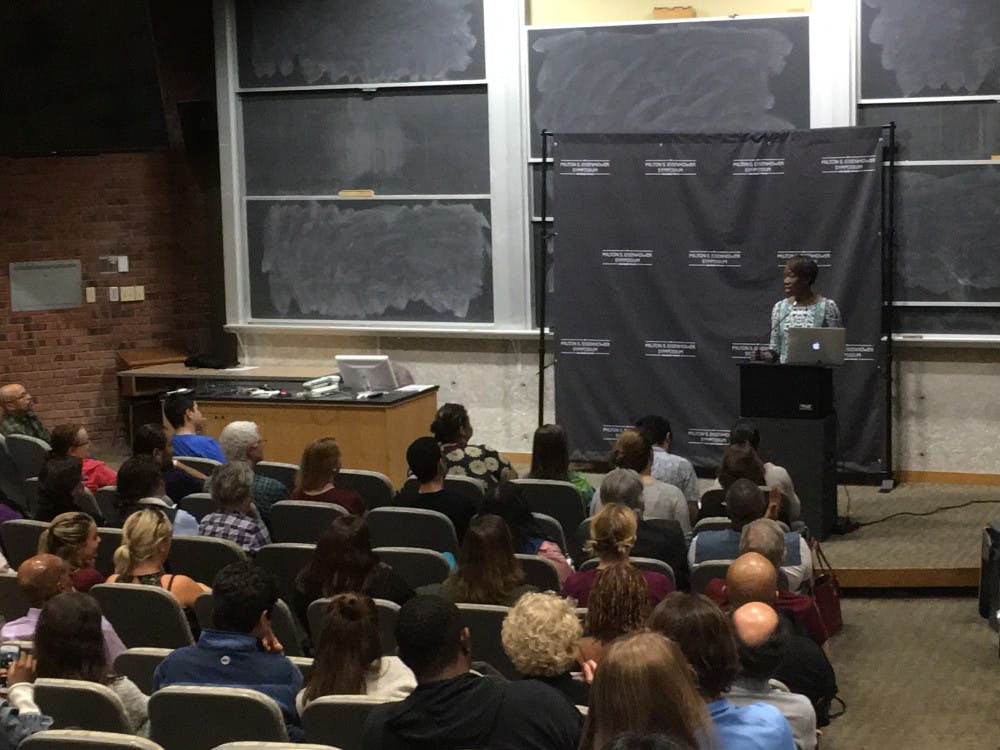The Alexander Grass Humanities Institute presented “Life Sentences: A Conference on Incarceration and the Humanities” on Nov. 9 and 10. The conference explored the impact of incarceration on society by taking a close look at the literature, film and history of imprisonment.
Nathan Connolly, associate professor of history, helped organize the conference. He noted the contributions to academia made by people who were incarcerated.
“The conference was important to try to acknowledge that we have a whole host of debt to people who have been behind bars,” Connolly said. “The humanities as a discipline has a foot in prison.”
For example, he explained that the writings of activist and former prisoner George Jackson inspired philosopher Michele Foucault.
Connolly explained that one of the goals of “Life Sentences” was to feature not only scholars but also former inmates.
“It was really important for us not to allow [the conference] to become too academic,” he said.
Live streaming of the two-day conference drew over 25,000 viewers.
Events included a screening of the documentary The Prison in Twelve Landscapes and a lecture by Nikhil Singh, associate professor of Social and Cultural Analysis and history at New York University.
In lieu of a keynote speaker, Dan Berger, associate professor of Comparative Ethnic Studies at the University of Washington Bothell, led a public forum on the topic of incarceration. The forum aimed to help the audience reflect on the conversations about incarceration and share their own experiences.
At the beginning of the discussion, Berger encouraged the audience to think about how critical narratives surrrounding mass incarceration gained popularity in recent years.
He cited Michelle Alexander’s 2010 book The New Jim Crow: Mass Incarceration in the Age of Colorblindness as an example.
“It sympathized with an array of critiques [of mass incarceration] and bubbling activism that had been developing for two decades,” Berger said. “It appeared at the right time and the right place.”
Berger also commented on the development of prison reforms in recent years.
“We have the emergence and dramatic failure of bi-partisan prison reform,” he said. “We have increased the visibility and coordination of formerly incarcerated people organizing serious hunger and labor strikes in prisons around the country... and we have seen really powerful campaigns that connected the problem of prison to that of policing and other aspects of a [prison] state.”
He also highlighted the contrast between activism for incarcerated people and prison expansion projects by the state.
“The [prison] state is sapping our capacity all the time. And the state is going to fill those new prisons — that’s how it works,” he said.
Finally, Berger offered a personal account of his own experience in 2011 working with a group of prison reformers in Philadelphia. The group called itself “Decarcerate PA.”
He discussed the group’s success in bringing people involved with the carceral state into a collective effort to redirect money spent on building prisons to communities that incarceration had always preyed on.
“It’s telling that in 2012, Pennsylvania was the only state that had a right-wing governor who was defeated electorally,” Berger said. “In 2017, on Tuesday last week, the city of Philadelphia just elected the most radical person to hold District Attorney’s office while just twenty-years ago, the city was known for having a DA who touted her pursuit of the death penalty.”
Sam Scharff, a graduate student at the Hopkins School of Medicine and an organizer of the conference, participated in the public forum.
“Our discussion group raised the question: How do we create liberating work that can contribute to emancipatory political movements while still considering the responsibilities that can come with the agency that we’re trying to restore?” Scharff said.
Audience member Talila Lewis addressed everyone present at the conference.
“I just want to remind us all of our immense privilege. We’re talking about a lot of things we’re not in close proximity to often,” Lewis said. “A lot today has been filled with grand eloquence and super elitism, and there is a lack of acknowledgement of the inability of many folks to even enter this space.”
She expressed her frustration with this disparity in opportunity and emphasized that people should figure out how to alleviate it.
After the conference, senior Ian O’Connor-Giles shared his opinions on the event.
“They put together a very interesting conference on an important issue, and I got to meet cool people working on prison activism at different levels,” O’Connor-Giles said. “I’m glad that they held the conference a little bit off campus and consciously tried to engage the community.”
O’Connor-Giles was particularly interested in how Decarcerate PA mobilized others to vote in favor of criminal justice reform.
“On a national level, the incarcerated and formally incarcerated population would make for a massive, organizable and mobilizable demographic that is much greater than union members,” O’Connor-Giles said.
Morgan Ome contributed reporting.





